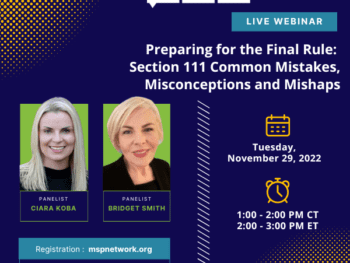
If a non-group health plan — liability, no-fault, or workers’ compensation insurer — fails to report the settlement obligation to Medicare on time, it could result in a whopping penalty.
As an example: Let’s say the final settlement of a workers’ compensation case occurred on April 1, 2020. The information is supposed to be reported during the next quarterly reporting period but no later than one year after the settlement date to avoid a penalty. But if it’s not reported until June 2021, the organization could face a fine of $365,000. That’s the maximum penalty proposed by the Centers for Medicare and Medicaid Services for failing to meet its reporting requirements.
CMS is expected to announce and implement the final rule any day now. Stakeholders involved in CMS reporting are strongly advised to make sure they meet all the necessary requirements to avoid facing such penalties.
Click Link to Access Free PDF Download
“8 ‘Think Outside the Box’ Tactics to Settle Workers’ Comp Claims”
Proposed Rule
CMS’ Section 111 reporting is aimed at ensuring Medicare does not pay for medical care that should be covered by another entity. Up to now and until the final rule is announced, the agency has not been able to impose a monetary penalty. But the final rule will likely be a close match to the proposed rule, with some minor modifications.
There are several scenarios in which CMS says it can impose penalties, including:
- Failure to Report at All. The Responsible Reporting Entity (RRE) — liability, no-fault, or workers’ compensation payer— must report to CMS at various stages of a claim involving a Medicare beneficiary. For example,
- The Query Process; identifying Medicare-eligible claimants.
- Ongoing Responsibility for Medical (ORM); when the RRE determines it will assume responsibility to pay for medical care associated with the claim, or when it terminates such responsibility.
- Total Payment Obligation to the Claimant (TPOC), signaling a settlement, judgment or award of the claim. This is typically done concurrently with ORM terminating.
- Exceed Error Tolerances: The RRE has reported as required; however, there have been errors in some of the reports. CMS has determined a threshold, after which a fine may be imposed.
- Contradictory Information: The reports from the RRE contradict one another. For example, the RRE incorrectly inputs the diagnostic code for the injury and, in a subsequent report, uses the correct code. The ‘contradiction’ could result in a penalty.
Seemingly minor, unintentional mistakes can prove costly. A simple typo can result in a massive fine. The good news is that, at least in the proposed rule, there are ‘safe harbors’ identified, where organizations can avoid hefty fines.
Guidance to Dodge Penalties
The proposed rule states that CMS will not impose penalties if any of the following conditions are met:
- Reporting within one year: A Non-Group Health Plan (NGHP) entity reports information within one year of the date of settlement.
- Comply with reporting error thresholds: A reporting entity’s submission complies with the reporting error thresholds.
- Good faith efforts: An NGHP entity that is unable to obtain required reporting information from Medicare beneficiaries documents ‘good faith efforts’ to obtain the information, such as a Social Security number.
‘Good faith efforts’ are defined as a series of steps:
- The NGHP has communicated the need for this information to the individual and his or her attorney or other representative and requested the information from the individual and his or her attorney or other representatives at least twice by mail and at least once by phone or other means of contact such as electronic mail in the absence of a response to the mailings.
- The NGHP certifies that it has not received a response in writing, or has received a response in writing that the individual will not provide his or her Medicare Beneficiary Identifier (MBI) or SSN (or last 5 digits of his or her SSN).
- The NGHP has documented its records to reflect its efforts to obtain the MBI or SSN (or the last 5 digits of the SSN) and the reason for the failure to collect this information.
The NGHP entity should keep records of these good-faith efforts (such as dates and types of communications with the individual) for 5 years so they can be produced as mitigating evidence if CMS ever contemplates imposing a penalty.
Besides CMS safe harbors, these additional steps mitigate the potential for penalties.
- Query: Query claims on a monthly basis with CMS to identify Medicare beneficiary claimants.
- ORM acceptance: These should be reported on the next quarterly file submission after the ORM date, and not more than 135 days after.
- TPOCs: These should also be completed on the next quarterly file submission and no later than 135 days after the TPOC date.
- ORM termination: These should be completed on the next quarterly file submission after ORM termination occurs.
- Accurate and complete: Report accurate, only those related to the injury, and complete, all related to the injury, diagnosis codes.
Conclusion
The minutiae of accurately adhering to CMS Section 111 requirements can be tedious and nerve-wracking for all but the experts. With the impending implementation of potentially exorbitant penalties, it is incumbent on affected organizations to partner with those adept at navigating the complexity of CMS’ rules and regulations.

Contact: mstack@reduceyourworkerscomp.com.
Workers’ Comp Roundup Blog: https://blog.reduceyourworkerscomp.com/
©2020 Amaxx LLC. All rights reserved under International Copyright Law.
Do not use this information without independent verification. All state laws vary. You should consult with your insurance broker, attorney, or qualified professional.


























